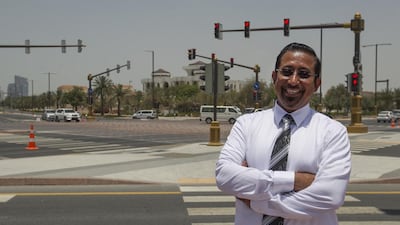ABU DHABI // Hassan Al Jabri is constantly amazed by the number of drivers who fail to use their indicators when changing lanes or overtaking another vehicle.
“It’s very strange,” said the 46-year-old office manager from Tanzania, who is an Abu Dhabi traffic safety ambassador. “Almost all drivers – young and old, men and women – are not using their indicator lights to show others they intend to change directions.”
For two years, Mr Al Jabri used to make a 220km round-trip to his office at Ibn Battuta Gate in Dubai from his home in Abu Dhabi. In February of this year, his company moved to the Khalifa Industrial Zone Abu Dhabi (Kizad), a much shorter drive up the E11 motorway.
Many do not bother to wear their seat belts while driving, back-seat passengers are not buckled up, while children are not restrained by booster seats, he said.
“I’ve been to the US and Canada and they’re very strict when it comes to seat-belt use,” he said. “People need to understand the risks they are putting themselves under for not wearing a seat belt.”
He and his family lived in Dubai since 1998 before moving to Abu Dhabi about six years ago. The couple has four daughters, 5, 10, 13 and 18 years old.
Although taxi drivers are viewed by many as reckless drivers, they are not the most dangerous in the UAE, he said.
“They spend more than eight to nine hours on the road so they are more experienced than you and me,” Mr Jabri said. “They are always in a hurry to pick up and drop passengers to earn a good commission.”
Jumping red lights and speeding are the most serious traffic offences he regularly sees, he said.
“Drivers tend to increase their speed as they approach junctions when traffic lights turn from green to yellow,” Mr Al Jabri said. “It’s very dangerous. Police may be overwhelmed with the growing number of vehicles and road users but they are doing a great job.”
In March, Abu Dhabi Police selected 100 traffic safety ambassadors from a pool of 2,000 applicants who were willing to help raise community awareness about road safety and traffic laws.
Mr Al Jabri is one of these. “We are encouraged to use social media to spread traffic safety awareness,” he said. “But I think it will be more helpful if some of the traffic safety ambassadors’ vehicles are converted to ‘light’ patrols. We may not have full authority but when motorists see us on the road, they will be encouraged to reduce their speed.”
rruiz@thenational.ae

